Analyzing Effective Management, Leadership, and HRM Strategies
VerifiedAdded on 2023/06/18
|11
|2748
|340
Essay
AI Summary
This essay provides a self-reflective analysis of management, leadership, and Human Resource Management (HRM) principles, emphasizing their roles in organizational success and change management. It delves into the characteristics of effective management, highlighting the importance of decision-making, employee development, and alignment of strategies with organizational goals. The essay discusses the duties and responsibilities of managers in leading organizational change, including motivation, transition management, and sustaining momentum, alongside engaging people, holding accountability, and effective communication. Furthermore, it examines how HRM policies and procedures, such as workforce planning, creating suitable work culture, and training and development programs, contribute to successfully managing people and maintaining a competitive advantage. The analysis uses examples, such as Tesco, to illustrate these concepts, concluding that effective people management is crucial for fostering productivity, supervising staff morale, and ensuring proper task distribution during organizational changes.
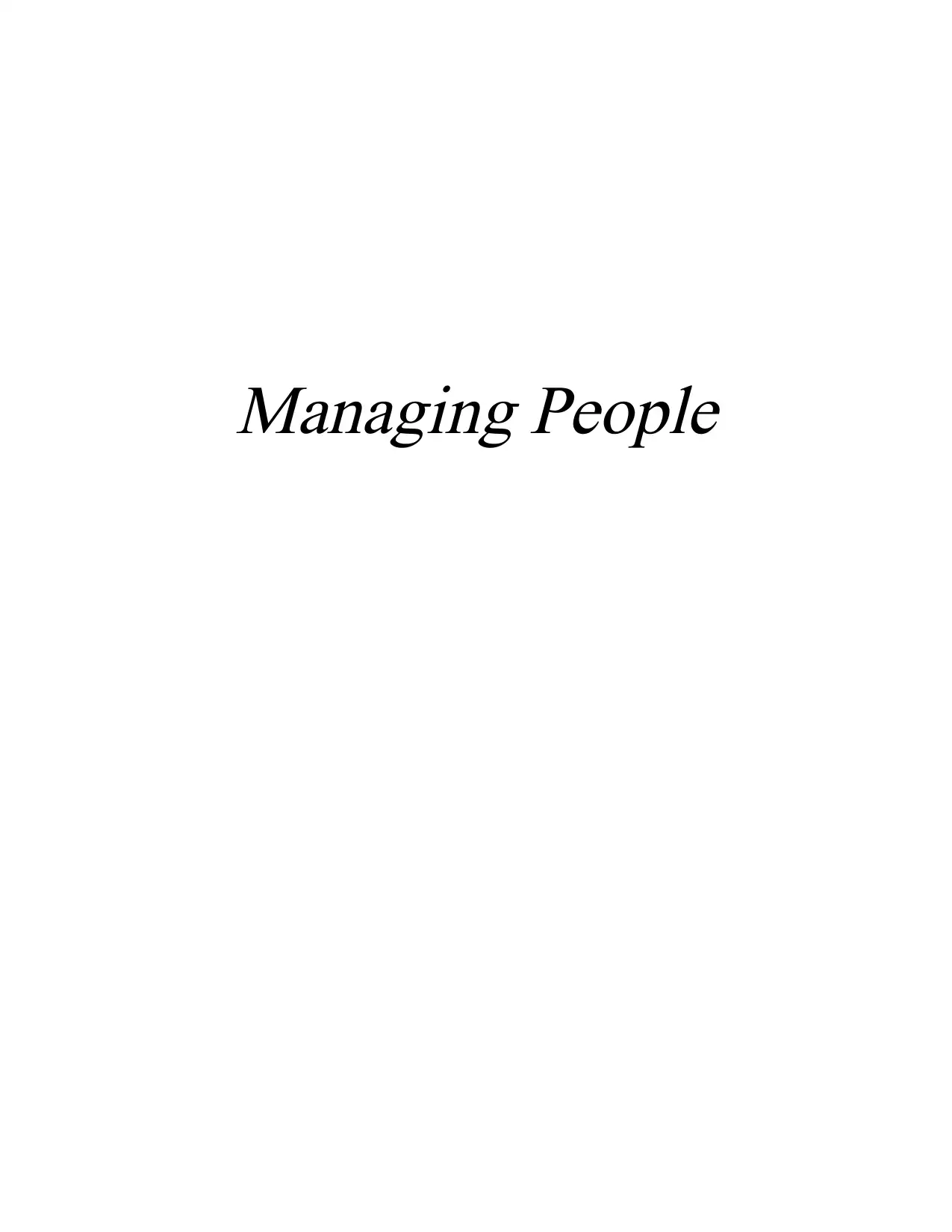
Managing People
Paraphrase This Document
Need a fresh take? Get an instant paraphrase of this document with our AI Paraphraser
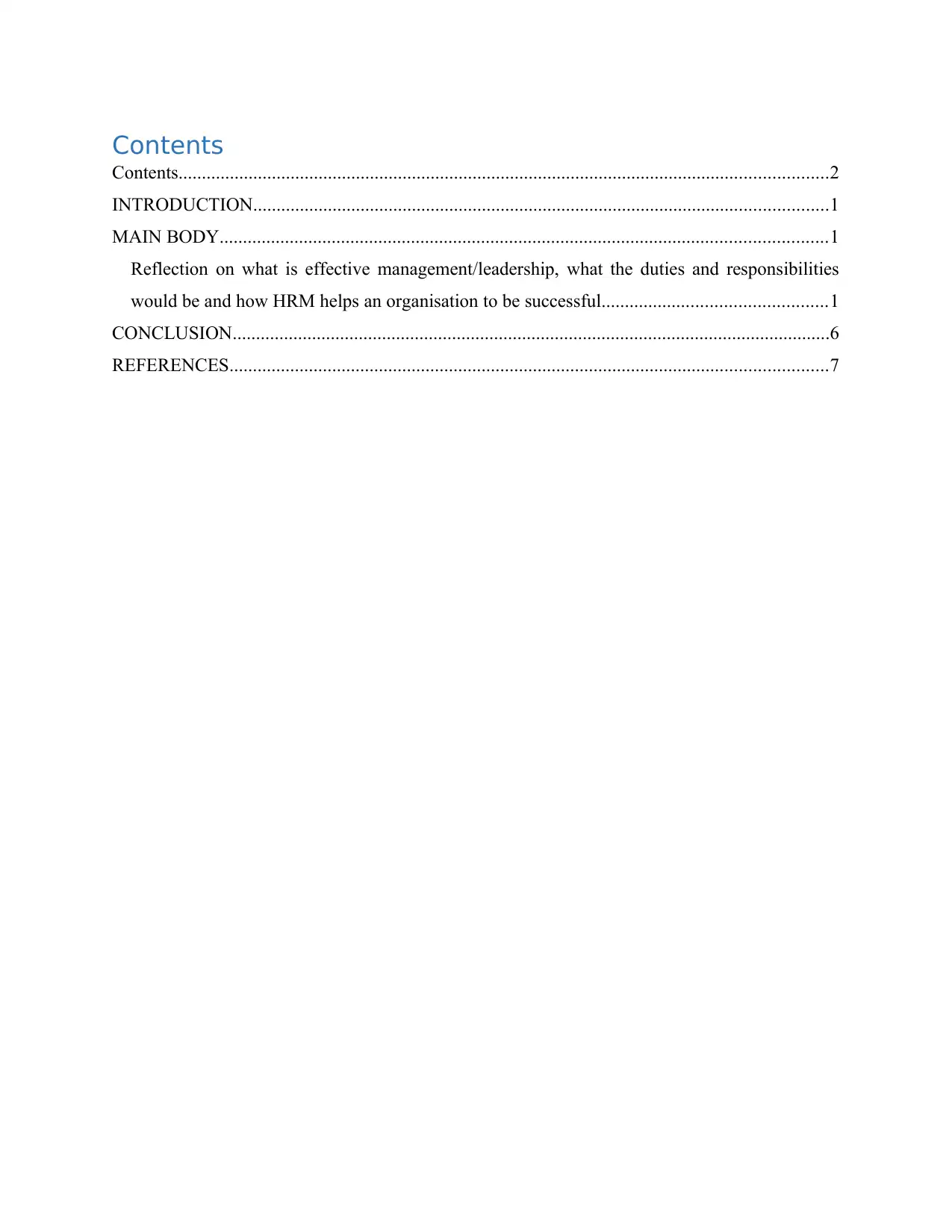
Contents
Contents...........................................................................................................................................2
INTRODUCTION...........................................................................................................................1
MAIN BODY..................................................................................................................................1
Reflection on what is effective management/leadership, what the duties and responsibilities
would be and how HRM helps an organisation to be successful................................................1
CONCLUSION................................................................................................................................6
REFERENCES................................................................................................................................7
Contents...........................................................................................................................................2
INTRODUCTION...........................................................................................................................1
MAIN BODY..................................................................................................................................1
Reflection on what is effective management/leadership, what the duties and responsibilities
would be and how HRM helps an organisation to be successful................................................1
CONCLUSION................................................................................................................................6
REFERENCES................................................................................................................................7
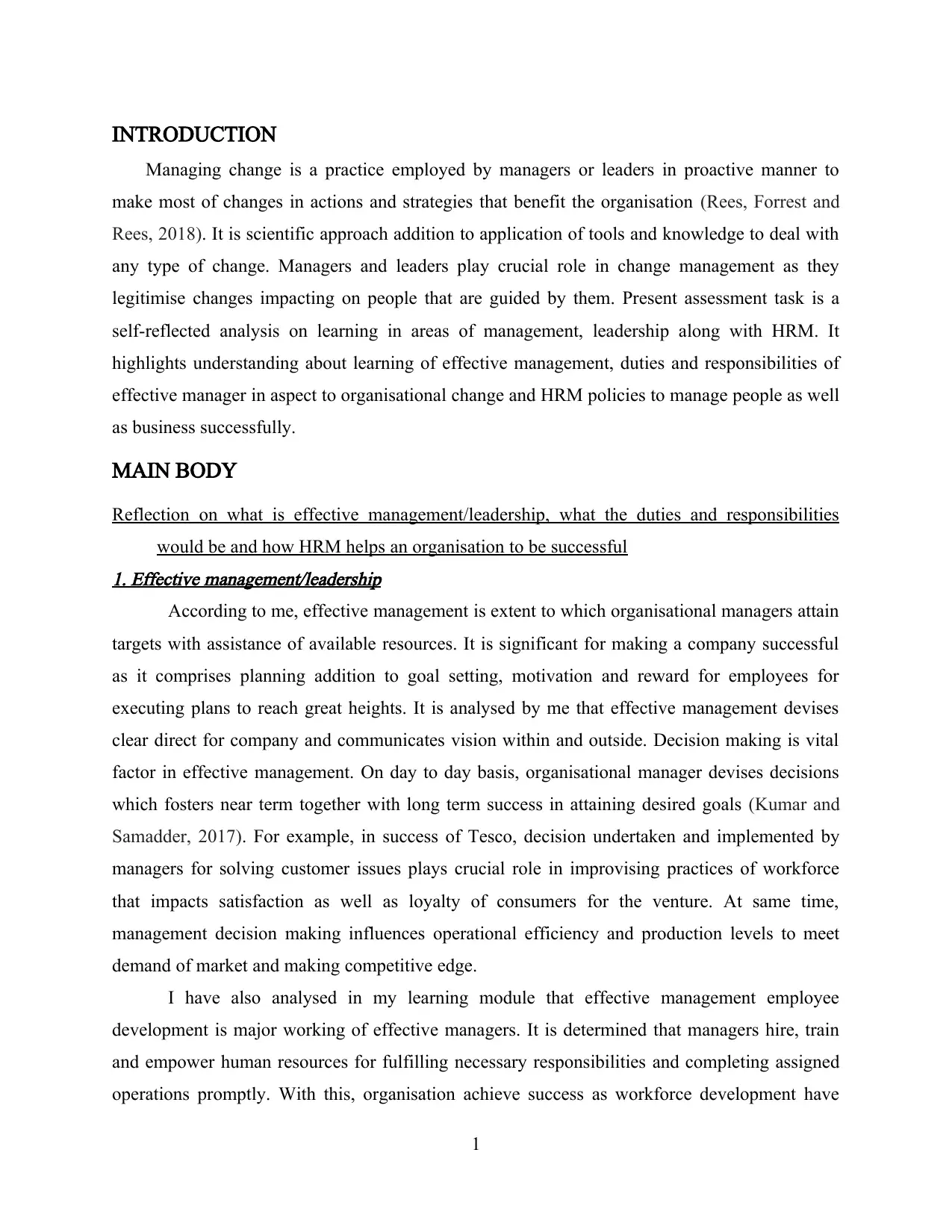
INTRODUCTION
Managing change is a practice employed by managers or leaders in proactive manner to
make most of changes in actions and strategies that benefit the organisation (Rees, Forrest and
Rees, 2018). It is scientific approach addition to application of tools and knowledge to deal with
any type of change. Managers and leaders play crucial role in change management as they
legitimise changes impacting on people that are guided by them. Present assessment task is a
self-reflected analysis on learning in areas of management, leadership along with HRM. It
highlights understanding about learning of effective management, duties and responsibilities of
effective manager in aspect to organisational change and HRM policies to manage people as well
as business successfully.
MAIN BODY
Reflection on what is effective management/leadership, what the duties and responsibilities
would be and how HRM helps an organisation to be successful1. Effective management/leadership
According to me, effective management is extent to which organisational managers attain
targets with assistance of available resources. It is significant for making a company successful
as it comprises planning addition to goal setting, motivation and reward for employees for
executing plans to reach great heights. It is analysed by me that effective management devises
clear direct for company and communicates vision within and outside. Decision making is vital
factor in effective management. On day to day basis, organisational manager devises decisions
which fosters near term together with long term success in attaining desired goals (Kumar and
Samadder, 2017). For example, in success of Tesco, decision undertaken and implemented by
managers for solving customer issues plays crucial role in improvising practices of workforce
that impacts satisfaction as well as loyalty of consumers for the venture. At same time,
management decision making influences operational efficiency and production levels to meet
demand of market and making competitive edge.
I have also analysed in my learning module that effective management employee
development is major working of effective managers. It is determined that managers hire, train
and empower human resources for fulfilling necessary responsibilities and completing assigned
operations promptly. With this, organisation achieve success as workforce development have
1
Managing change is a practice employed by managers or leaders in proactive manner to
make most of changes in actions and strategies that benefit the organisation (Rees, Forrest and
Rees, 2018). It is scientific approach addition to application of tools and knowledge to deal with
any type of change. Managers and leaders play crucial role in change management as they
legitimise changes impacting on people that are guided by them. Present assessment task is a
self-reflected analysis on learning in areas of management, leadership along with HRM. It
highlights understanding about learning of effective management, duties and responsibilities of
effective manager in aspect to organisational change and HRM policies to manage people as well
as business successfully.
MAIN BODY
Reflection on what is effective management/leadership, what the duties and responsibilities
would be and how HRM helps an organisation to be successful1. Effective management/leadership
According to me, effective management is extent to which organisational managers attain
targets with assistance of available resources. It is significant for making a company successful
as it comprises planning addition to goal setting, motivation and reward for employees for
executing plans to reach great heights. It is analysed by me that effective management devises
clear direct for company and communicates vision within and outside. Decision making is vital
factor in effective management. On day to day basis, organisational manager devises decisions
which fosters near term together with long term success in attaining desired goals (Kumar and
Samadder, 2017). For example, in success of Tesco, decision undertaken and implemented by
managers for solving customer issues plays crucial role in improvising practices of workforce
that impacts satisfaction as well as loyalty of consumers for the venture. At same time,
management decision making influences operational efficiency and production levels to meet
demand of market and making competitive edge.
I have also analysed in my learning module that effective management employee
development is major working of effective managers. It is determined that managers hire, train
and empower human resources for fulfilling necessary responsibilities and completing assigned
operations promptly. With this, organisation achieve success as workforce development have
1
⊘ This is a preview!⊘
Do you want full access?
Subscribe today to unlock all pages.

Trusted by 1+ million students worldwide
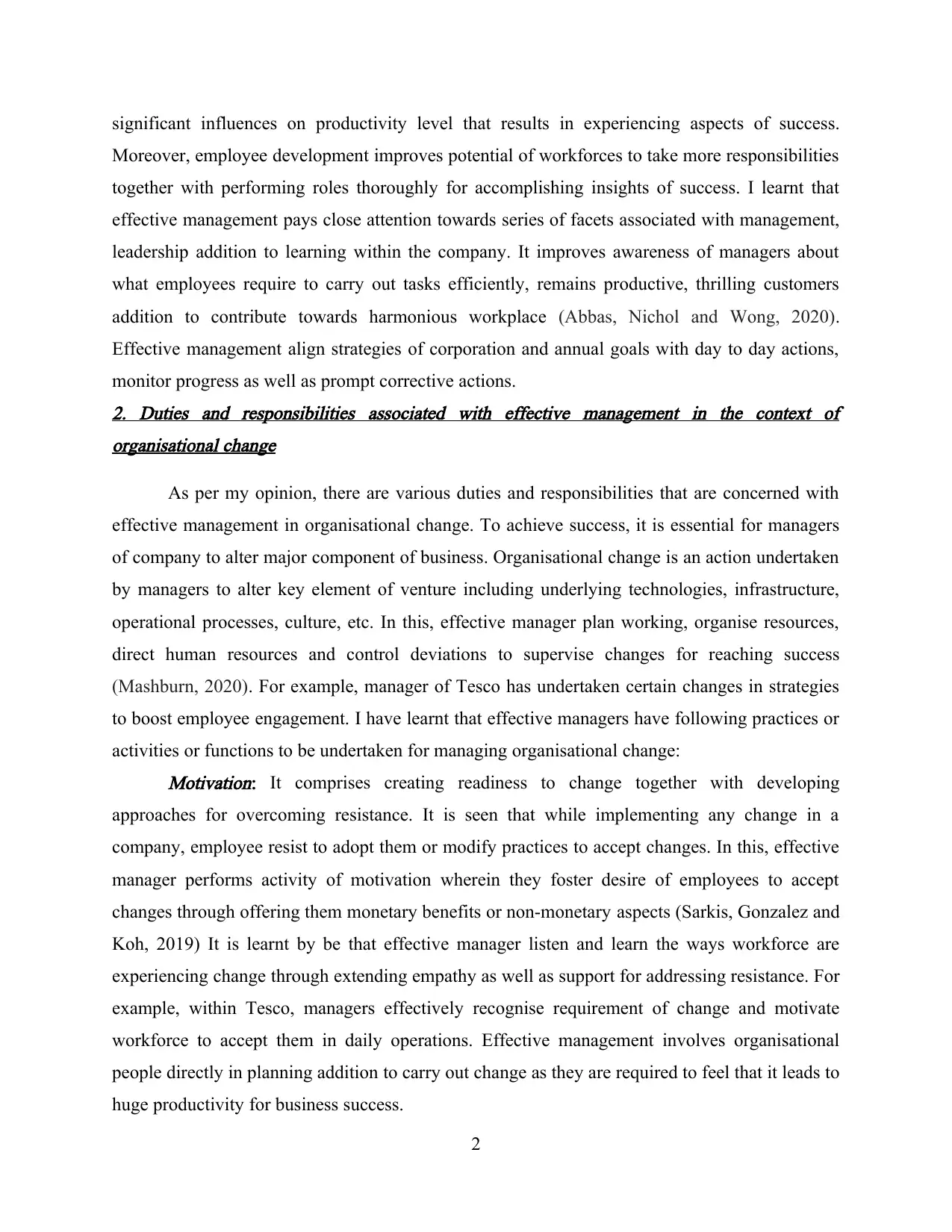
significant influences on productivity level that results in experiencing aspects of success.
Moreover, employee development improves potential of workforces to take more responsibilities
together with performing roles thoroughly for accomplishing insights of success. I learnt that
effective management pays close attention towards series of facets associated with management,
leadership addition to learning within the company. It improves awareness of managers about
what employees require to carry out tasks efficiently, remains productive, thrilling customers
addition to contribute towards harmonious workplace (Abbas, Nichol and Wong, 2020).
Effective management align strategies of corporation and annual goals with day to day actions,
monitor progress as well as prompt corrective actions.2. Duties and responsibilities associated with effective management in the context of
organisational change
As per my opinion, there are various duties and responsibilities that are concerned with
effective management in organisational change. To achieve success, it is essential for managers
of company to alter major component of business. Organisational change is an action undertaken
by managers to alter key element of venture including underlying technologies, infrastructure,
operational processes, culture, etc. In this, effective manager plan working, organise resources,
direct human resources and control deviations to supervise changes for reaching success
(Mashburn, 2020). For example, manager of Tesco has undertaken certain changes in strategies
to boost employee engagement. I have learnt that effective managers have following practices or
activities or functions to be undertaken for managing organisational change:
Motivation: It comprises creating readiness to change together with developing
approaches for overcoming resistance. It is seen that while implementing any change in a
company, employee resist to adopt them or modify practices to accept changes. In this, effective
manager performs activity of motivation wherein they foster desire of employees to accept
changes through offering them monetary benefits or non-monetary aspects (Sarkis, Gonzalez and
Koh, 2019) It is learnt by be that effective manager listen and learn the ways workforce are
experiencing change through extending empathy as well as support for addressing resistance. For
example, within Tesco, managers effectively recognise requirement of change and motivate
workforce to accept them in daily operations. Effective management involves organisational
people directly in planning addition to carry out change as they are required to feel that it leads to
huge productivity for business success.
2
Moreover, employee development improves potential of workforces to take more responsibilities
together with performing roles thoroughly for accomplishing insights of success. I learnt that
effective management pays close attention towards series of facets associated with management,
leadership addition to learning within the company. It improves awareness of managers about
what employees require to carry out tasks efficiently, remains productive, thrilling customers
addition to contribute towards harmonious workplace (Abbas, Nichol and Wong, 2020).
Effective management align strategies of corporation and annual goals with day to day actions,
monitor progress as well as prompt corrective actions.2. Duties and responsibilities associated with effective management in the context of
organisational change
As per my opinion, there are various duties and responsibilities that are concerned with
effective management in organisational change. To achieve success, it is essential for managers
of company to alter major component of business. Organisational change is an action undertaken
by managers to alter key element of venture including underlying technologies, infrastructure,
operational processes, culture, etc. In this, effective manager plan working, organise resources,
direct human resources and control deviations to supervise changes for reaching success
(Mashburn, 2020). For example, manager of Tesco has undertaken certain changes in strategies
to boost employee engagement. I have learnt that effective managers have following practices or
activities or functions to be undertaken for managing organisational change:
Motivation: It comprises creating readiness to change together with developing
approaches for overcoming resistance. It is seen that while implementing any change in a
company, employee resist to adopt them or modify practices to accept changes. In this, effective
manager performs activity of motivation wherein they foster desire of employees to accept
changes through offering them monetary benefits or non-monetary aspects (Sarkis, Gonzalez and
Koh, 2019) It is learnt by be that effective manager listen and learn the ways workforce are
experiencing change through extending empathy as well as support for addressing resistance. For
example, within Tesco, managers effectively recognise requirement of change and motivate
workforce to accept them in daily operations. Effective management involves organisational
people directly in planning addition to carry out change as they are required to feel that it leads to
huge productivity for business success.
2
Paraphrase This Document
Need a fresh take? Get an instant paraphrase of this document with our AI Paraphraser
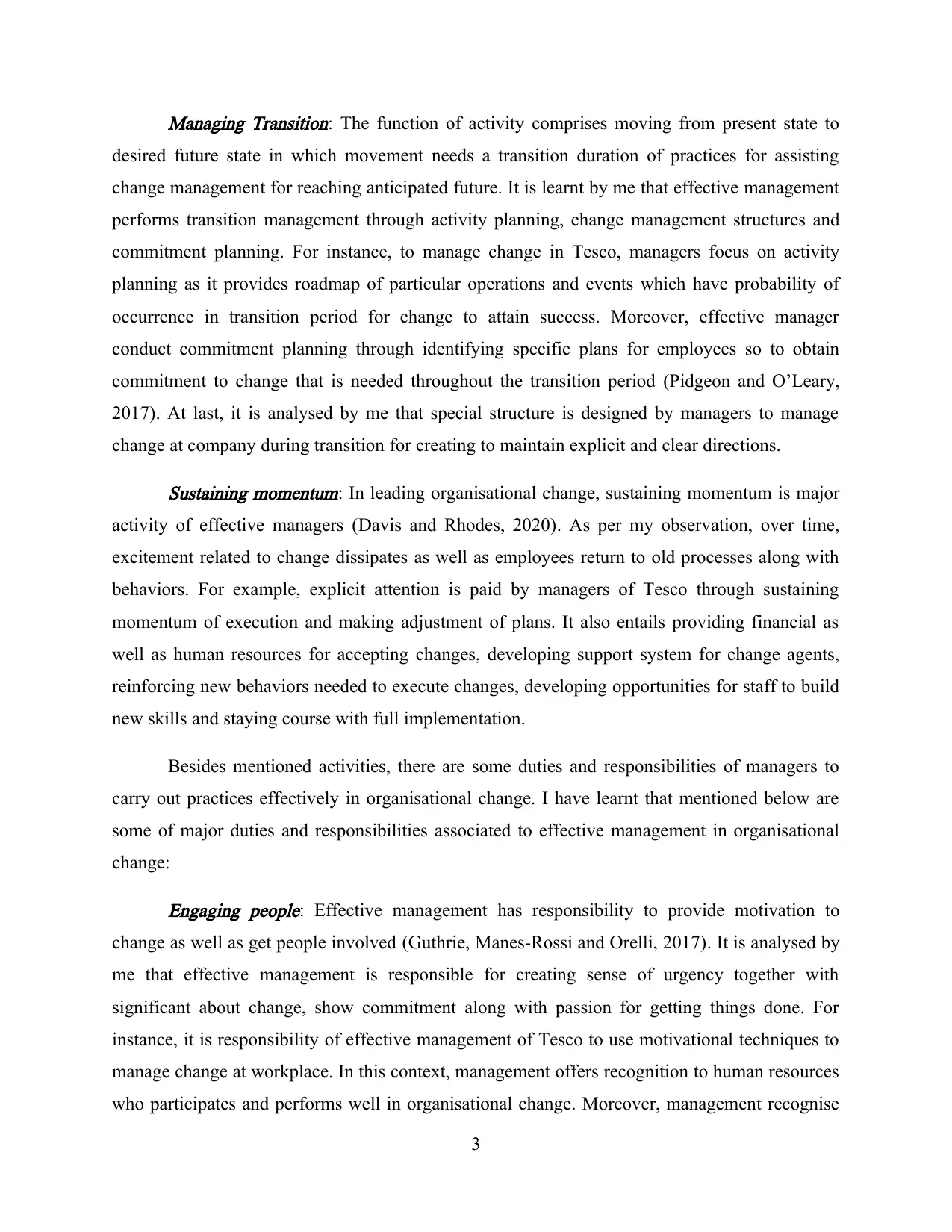
Managing Transition: The function of activity comprises moving from present state to
desired future state in which movement needs a transition duration of practices for assisting
change management for reaching anticipated future. It is learnt by me that effective management
performs transition management through activity planning, change management structures and
commitment planning. For instance, to manage change in Tesco, managers focus on activity
planning as it provides roadmap of particular operations and events which have probability of
occurrence in transition period for change to attain success. Moreover, effective manager
conduct commitment planning through identifying specific plans for employees so to obtain
commitment to change that is needed throughout the transition period (Pidgeon and O’Leary,
2017). At last, it is analysed by me that special structure is designed by managers to manage
change at company during transition for creating to maintain explicit and clear directions.Sustaining momentum: In leading organisational change, sustaining momentum is major
activity of effective managers (Davis and Rhodes, 2020). As per my observation, over time,
excitement related to change dissipates as well as employees return to old processes along with
behaviors. For example, explicit attention is paid by managers of Tesco through sustaining
momentum of execution and making adjustment of plans. It also entails providing financial as
well as human resources for accepting changes, developing support system for change agents,
reinforcing new behaviors needed to execute changes, developing opportunities for staff to build
new skills and staying course with full implementation.
Besides mentioned activities, there are some duties and responsibilities of managers to
carry out practices effectively in organisational change. I have learnt that mentioned below are
some of major duties and responsibilities associated to effective management in organisational
change:Engaging people: Effective management has responsibility to provide motivation to
change as well as get people involved (Guthrie, Manes-Rossi and Orelli, 2017). It is analysed by
me that effective management is responsible for creating sense of urgency together with
significant about change, show commitment along with passion for getting things done. For
instance, it is responsibility of effective management of Tesco to use motivational techniques to
manage change at workplace. In this context, management offers recognition to human resources
who participates and performs well in organisational change. Moreover, management recognise
3
desired future state in which movement needs a transition duration of practices for assisting
change management for reaching anticipated future. It is learnt by me that effective management
performs transition management through activity planning, change management structures and
commitment planning. For instance, to manage change in Tesco, managers focus on activity
planning as it provides roadmap of particular operations and events which have probability of
occurrence in transition period for change to attain success. Moreover, effective manager
conduct commitment planning through identifying specific plans for employees so to obtain
commitment to change that is needed throughout the transition period (Pidgeon and O’Leary,
2017). At last, it is analysed by me that special structure is designed by managers to manage
change at company during transition for creating to maintain explicit and clear directions.Sustaining momentum: In leading organisational change, sustaining momentum is major
activity of effective managers (Davis and Rhodes, 2020). As per my observation, over time,
excitement related to change dissipates as well as employees return to old processes along with
behaviors. For example, explicit attention is paid by managers of Tesco through sustaining
momentum of execution and making adjustment of plans. It also entails providing financial as
well as human resources for accepting changes, developing support system for change agents,
reinforcing new behaviors needed to execute changes, developing opportunities for staff to build
new skills and staying course with full implementation.
Besides mentioned activities, there are some duties and responsibilities of managers to
carry out practices effectively in organisational change. I have learnt that mentioned below are
some of major duties and responsibilities associated to effective management in organisational
change:Engaging people: Effective management has responsibility to provide motivation to
change as well as get people involved (Guthrie, Manes-Rossi and Orelli, 2017). It is analysed by
me that effective management is responsible for creating sense of urgency together with
significant about change, show commitment along with passion for getting things done. For
instance, it is responsibility of effective management of Tesco to use motivational techniques to
manage change at workplace. In this context, management offers recognition to human resources
who participates and performs well in organisational change. Moreover, management recognise
3
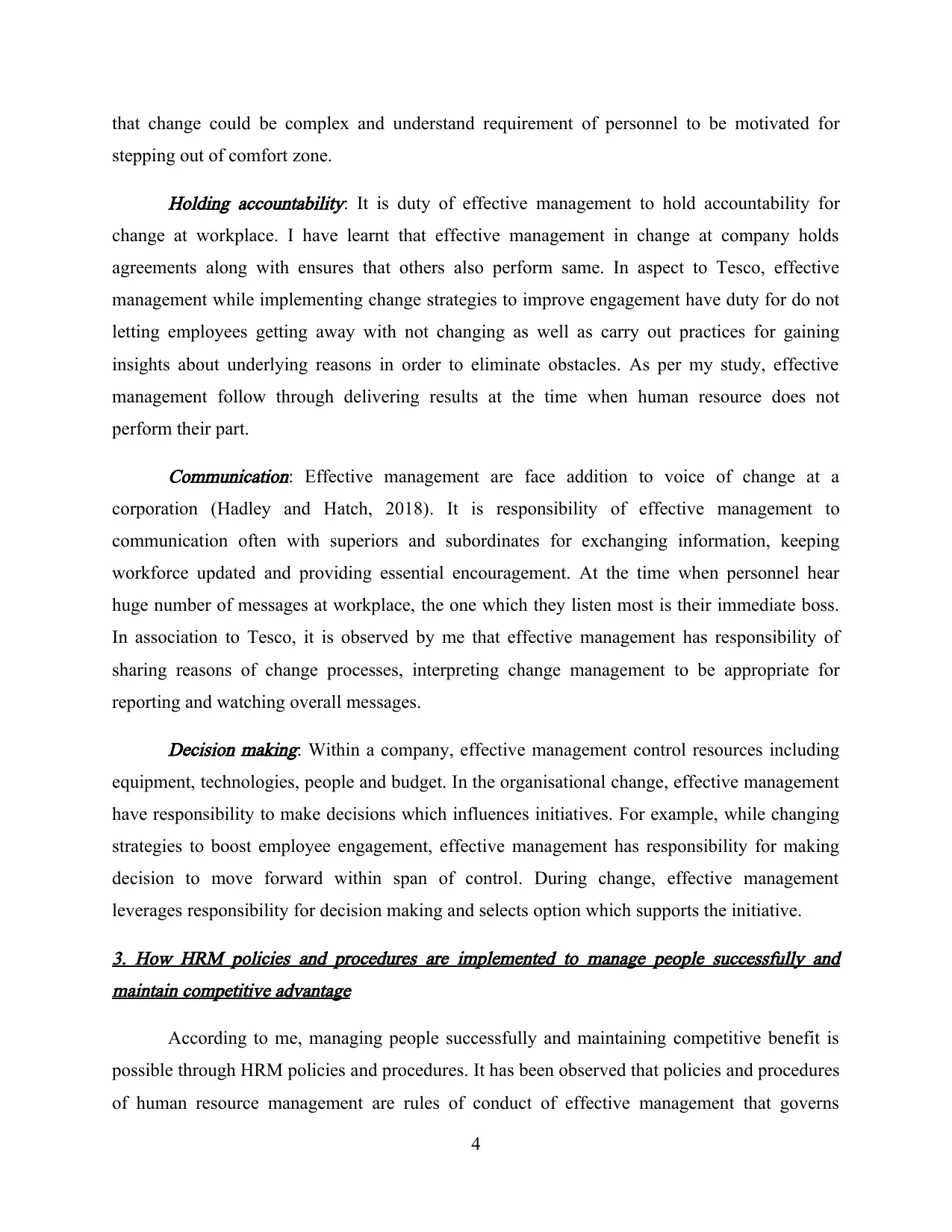
that change could be complex and understand requirement of personnel to be motivated for
stepping out of comfort zone.Holding accountability: It is duty of effective management to hold accountability for
change at workplace. I have learnt that effective management in change at company holds
agreements along with ensures that others also perform same. In aspect to Tesco, effective
management while implementing change strategies to improve engagement have duty for do not
letting employees getting away with not changing as well as carry out practices for gaining
insights about underlying reasons in order to eliminate obstacles. As per my study, effective
management follow through delivering results at the time when human resource does not
perform their part.Communication: Effective management are face addition to voice of change at a
corporation (Hadley and Hatch, 2018). It is responsibility of effective management to
communication often with superiors and subordinates for exchanging information, keeping
workforce updated and providing essential encouragement. At the time when personnel hear
huge number of messages at workplace, the one which they listen most is their immediate boss.
In association to Tesco, it is observed by me that effective management has responsibility of
sharing reasons of change processes, interpreting change management to be appropriate for
reporting and watching overall messages.Decision making: Within a company, effective management control resources including
equipment, technologies, people and budget. In the organisational change, effective management
have responsibility to make decisions which influences initiatives. For example, while changing
strategies to boost employee engagement, effective management has responsibility for making
decision to move forward within span of control. During change, effective management
leverages responsibility for decision making and selects option which supports the initiative.
3. How HRM policies and procedures are implemented to manage people successfully and
maintain competitive advantage
According to me, managing people successfully and maintaining competitive benefit is
possible through HRM policies and procedures. It has been observed that policies and procedures
of human resource management are rules of conduct of effective management that governs
4
stepping out of comfort zone.Holding accountability: It is duty of effective management to hold accountability for
change at workplace. I have learnt that effective management in change at company holds
agreements along with ensures that others also perform same. In aspect to Tesco, effective
management while implementing change strategies to improve engagement have duty for do not
letting employees getting away with not changing as well as carry out practices for gaining
insights about underlying reasons in order to eliminate obstacles. As per my study, effective
management follow through delivering results at the time when human resource does not
perform their part.Communication: Effective management are face addition to voice of change at a
corporation (Hadley and Hatch, 2018). It is responsibility of effective management to
communication often with superiors and subordinates for exchanging information, keeping
workforce updated and providing essential encouragement. At the time when personnel hear
huge number of messages at workplace, the one which they listen most is their immediate boss.
In association to Tesco, it is observed by me that effective management has responsibility of
sharing reasons of change processes, interpreting change management to be appropriate for
reporting and watching overall messages.Decision making: Within a company, effective management control resources including
equipment, technologies, people and budget. In the organisational change, effective management
have responsibility to make decisions which influences initiatives. For example, while changing
strategies to boost employee engagement, effective management has responsibility for making
decision to move forward within span of control. During change, effective management
leverages responsibility for decision making and selects option which supports the initiative.
3. How HRM policies and procedures are implemented to manage people successfully and
maintain competitive advantage
According to me, managing people successfully and maintaining competitive benefit is
possible through HRM policies and procedures. It has been observed that policies and procedures
of human resource management are rules of conduct of effective management that governs
4
⊘ This is a preview!⊘
Do you want full access?
Subscribe today to unlock all pages.

Trusted by 1+ million students worldwide
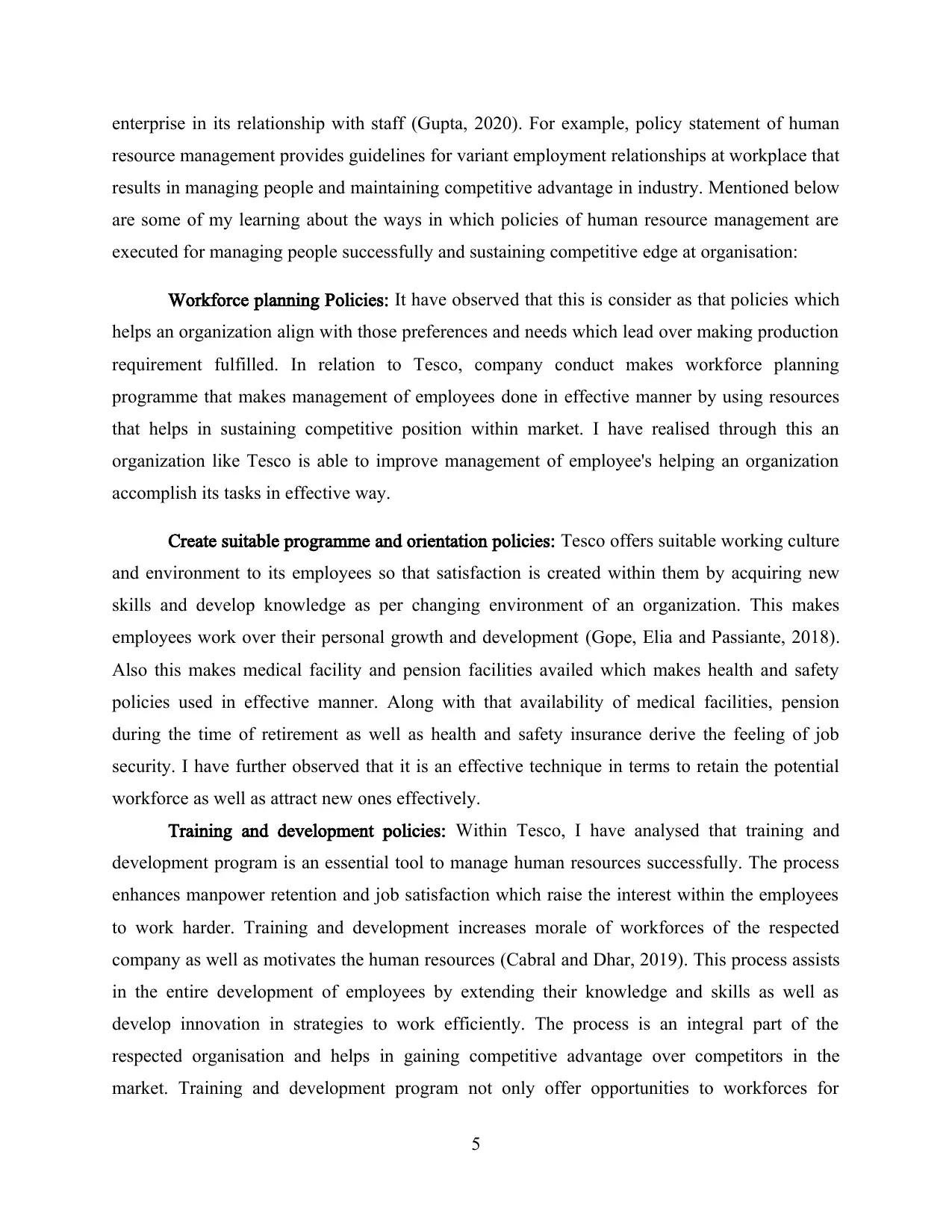
enterprise in its relationship with staff (Gupta, 2020). For example, policy statement of human
resource management provides guidelines for variant employment relationships at workplace that
results in managing people and maintaining competitive advantage in industry. Mentioned below
are some of my learning about the ways in which policies of human resource management are
executed for managing people successfully and sustaining competitive edge at organisation:
Workforce planning Policies: It have observed that this is consider as that policies which
helps an organization align with those preferences and needs which lead over making production
requirement fulfilled. In relation to Tesco, company conduct makes workforce planning
programme that makes management of employees done in effective manner by using resources
that helps in sustaining competitive position within market. I have realised through this an
organization like Tesco is able to improve management of employee's helping an organization
accomplish its tasks in effective way.
Create suitable programme and orientation policies: Tesco offers suitable working culture
and environment to its employees so that satisfaction is created within them by acquiring new
skills and develop knowledge as per changing environment of an organization. This makes
employees work over their personal growth and development (Gope, Elia and Passiante, 2018).
Also this makes medical facility and pension facilities availed which makes health and safety
policies used in effective manner. Along with that availability of medical facilities, pension
during the time of retirement as well as health and safety insurance derive the feeling of job
security. I have further observed that it is an effective technique in terms to retain the potential
workforce as well as attract new ones effectively.
Training and development policies: Within Tesco, I have analysed that training and
development program is an essential tool to manage human resources successfully. The process
enhances manpower retention and job satisfaction which raise the interest within the employees
to work harder. Training and development increases morale of workforces of the respected
company as well as motivates the human resources (Cabral and Dhar, 2019). This process assists
in the entire development of employees by extending their knowledge and skills as well as
develop innovation in strategies to work efficiently. The process is an integral part of the
respected organisation and helps in gaining competitive advantage over competitors in the
market. Training and development program not only offer opportunities to workforces for
5
resource management provides guidelines for variant employment relationships at workplace that
results in managing people and maintaining competitive advantage in industry. Mentioned below
are some of my learning about the ways in which policies of human resource management are
executed for managing people successfully and sustaining competitive edge at organisation:
Workforce planning Policies: It have observed that this is consider as that policies which
helps an organization align with those preferences and needs which lead over making production
requirement fulfilled. In relation to Tesco, company conduct makes workforce planning
programme that makes management of employees done in effective manner by using resources
that helps in sustaining competitive position within market. I have realised through this an
organization like Tesco is able to improve management of employee's helping an organization
accomplish its tasks in effective way.
Create suitable programme and orientation policies: Tesco offers suitable working culture
and environment to its employees so that satisfaction is created within them by acquiring new
skills and develop knowledge as per changing environment of an organization. This makes
employees work over their personal growth and development (Gope, Elia and Passiante, 2018).
Also this makes medical facility and pension facilities availed which makes health and safety
policies used in effective manner. Along with that availability of medical facilities, pension
during the time of retirement as well as health and safety insurance derive the feeling of job
security. I have further observed that it is an effective technique in terms to retain the potential
workforce as well as attract new ones effectively.
Training and development policies: Within Tesco, I have analysed that training and
development program is an essential tool to manage human resources successfully. The process
enhances manpower retention and job satisfaction which raise the interest within the employees
to work harder. Training and development increases morale of workforces of the respected
company as well as motivates the human resources (Cabral and Dhar, 2019). This process assists
in the entire development of employees by extending their knowledge and skills as well as
develop innovation in strategies to work efficiently. The process is an integral part of the
respected organisation and helps in gaining competitive advantage over competitors in the
market. Training and development program not only offer opportunities to workforces for
5
Paraphrase This Document
Need a fresh take? Get an instant paraphrase of this document with our AI Paraphraser
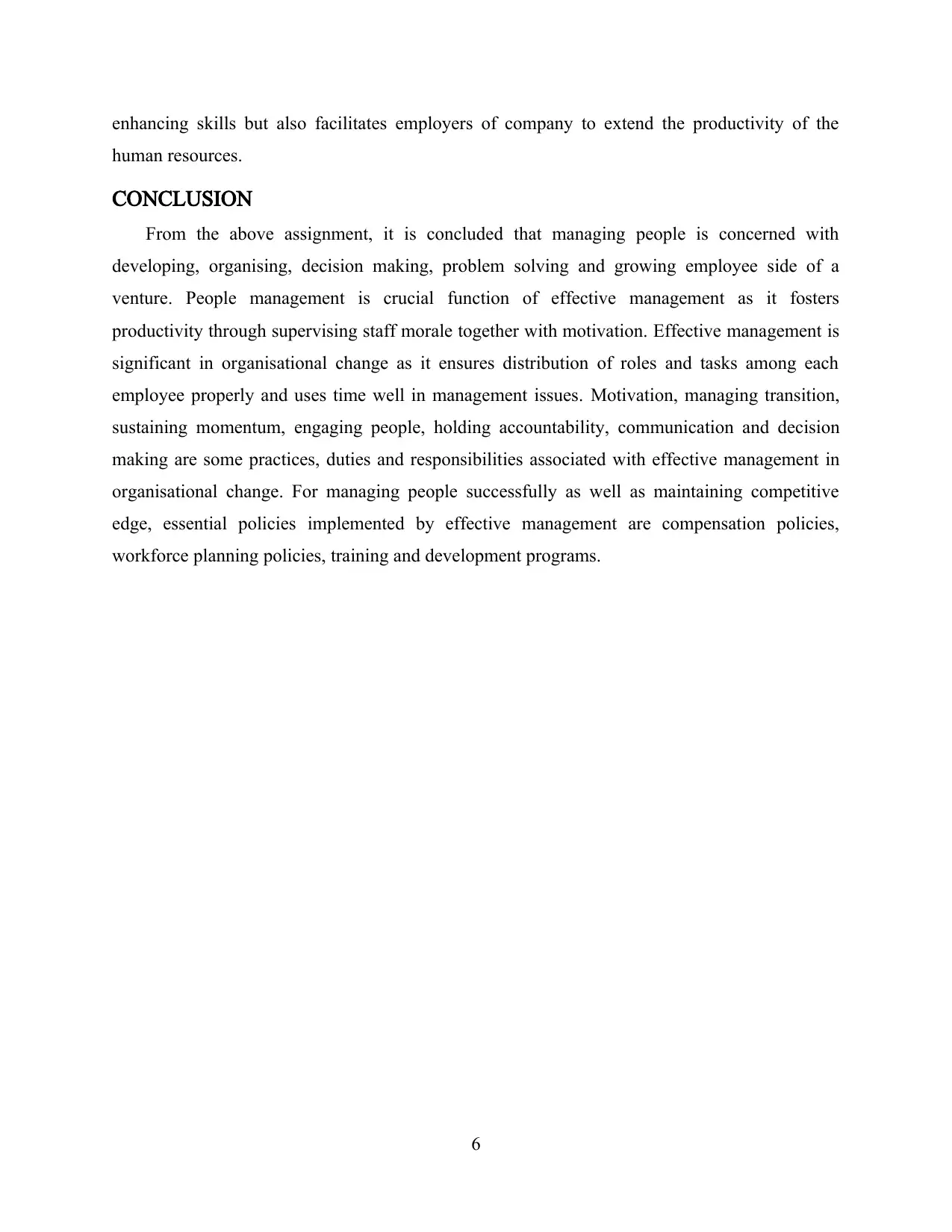
enhancing skills but also facilitates employers of company to extend the productivity of the
human resources.
CONCLUSION
From the above assignment, it is concluded that managing people is concerned with
developing, organising, decision making, problem solving and growing employee side of a
venture. People management is crucial function of effective management as it fosters
productivity through supervising staff morale together with motivation. Effective management is
significant in organisational change as it ensures distribution of roles and tasks among each
employee properly and uses time well in management issues. Motivation, managing transition,
sustaining momentum, engaging people, holding accountability, communication and decision
making are some practices, duties and responsibilities associated with effective management in
organisational change. For managing people successfully as well as maintaining competitive
edge, essential policies implemented by effective management are compensation policies,
workforce planning policies, training and development programs.
6
human resources.
CONCLUSION
From the above assignment, it is concluded that managing people is concerned with
developing, organising, decision making, problem solving and growing employee side of a
venture. People management is crucial function of effective management as it fosters
productivity through supervising staff morale together with motivation. Effective management is
significant in organisational change as it ensures distribution of roles and tasks among each
employee properly and uses time well in management issues. Motivation, managing transition,
sustaining momentum, engaging people, holding accountability, communication and decision
making are some practices, duties and responsibilities associated with effective management in
organisational change. For managing people successfully as well as maintaining competitive
edge, essential policies implemented by effective management are compensation policies,
workforce planning policies, training and development programs.
6
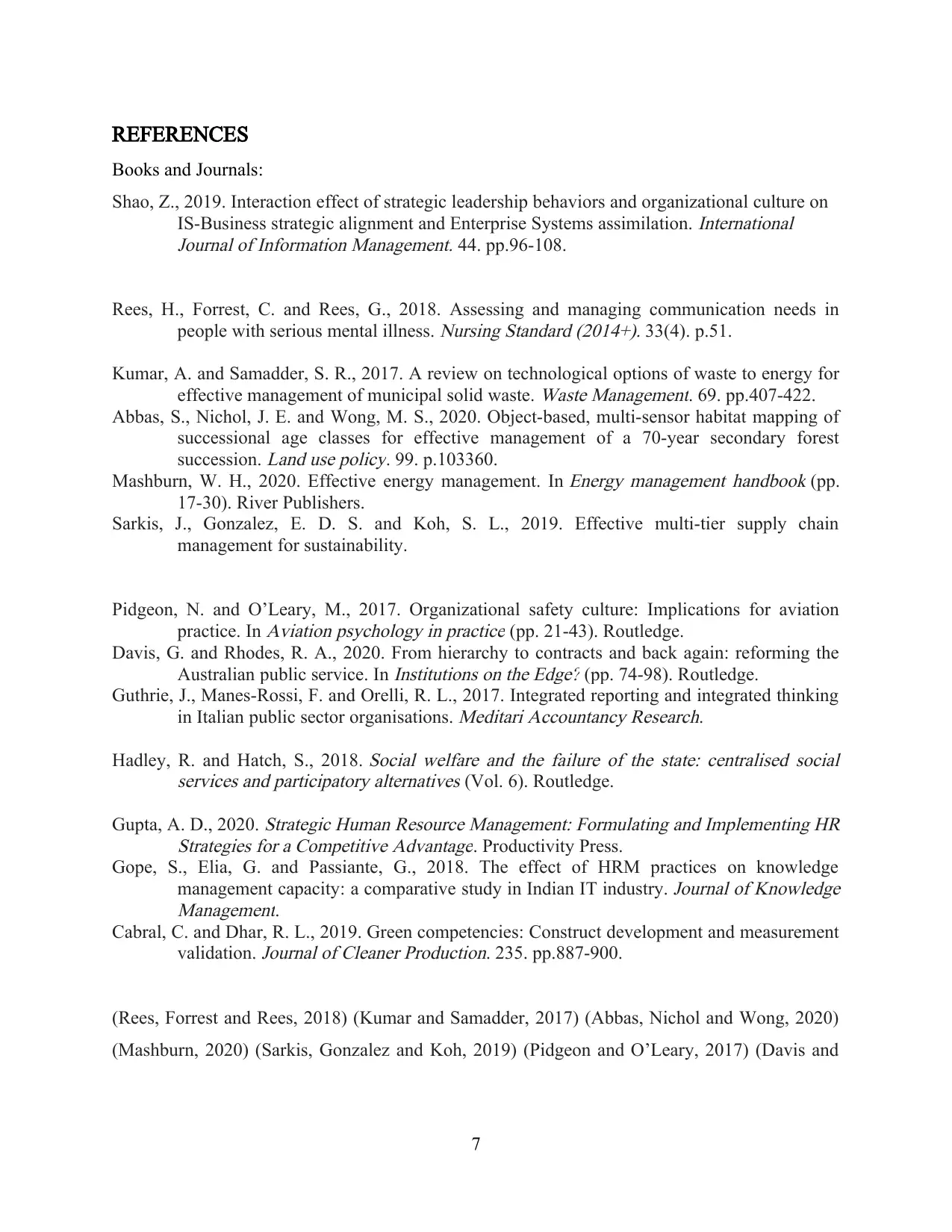
REFERENCES
Books and Journals:
Shao, Z., 2019. Interaction effect of strategic leadership behaviors and organizational culture on
IS-Business strategic alignment and Enterprise Systems assimilation.
International
Journal of Information Management. 44. pp.96-108.
Rees, H., Forrest, C. and Rees, G., 2018. Assessing and managing communication needs in
people with serious mental illness.
Nursing Standard (2014+). 33(4). p.51.
Kumar, A. and Samadder, S. R., 2017. A review on technological options of waste to energy for
effective management of municipal solid waste.
Waste Management. 69. pp.407-422.
Abbas, S., Nichol, J. E. and Wong, M. S., 2020. Object-based, multi-sensor habitat mapping of
successional age classes for effective management of a 70-year secondary forest
succession.
Land use policy. 99. p.103360.
Mashburn, W. H., 2020. Effective energy management. In
Energy management handbook (pp.
17-30). River Publishers.
Sarkis, J., Gonzalez, E. D. S. and Koh, S. L., 2019. Effective multi-tier supply chain
management for sustainability.
Pidgeon, N. and O’Leary, M., 2017. Organizational safety culture: Implications for aviation
practice. In
Aviation psychology in practice (pp. 21-43). Routledge.
Davis, G. and Rhodes, R. A., 2020. From hierarchy to contracts and back again: reforming the
Australian public service. In
Institutions on the Edge? (pp. 74-98). Routledge.
Guthrie, J., Manes-Rossi, F. and Orelli, R. L., 2017. Integrated reporting and integrated thinking
in Italian public sector organisations.
Meditari Accountancy Research.
Hadley, R. and Hatch, S., 2018.
Social welfare and the failure of the state: centralised social
services and participatory alternatives (Vol. 6). Routledge.
Gupta, A. D., 2020.
Strategic Human Resource Management: Formulating and Implementing HR
Strategies for a Competitive Advantage. Productivity Press.
Gope, S., Elia, G. and Passiante, G., 2018. The effect of HRM practices on knowledge
management capacity: a comparative study in Indian IT industry.
Journal of Knowledge
Management.
Cabral, C. and Dhar, R. L., 2019. Green competencies: Construct development and measurement
validation.
Journal of Cleaner Production. 235. pp.887-900.
(Rees, Forrest and Rees, 2018) (Kumar and Samadder, 2017) (Abbas, Nichol and Wong, 2020)
(Mashburn, 2020) (Sarkis, Gonzalez and Koh, 2019) (Pidgeon and O’Leary, 2017) (Davis and
7
Books and Journals:
Shao, Z., 2019. Interaction effect of strategic leadership behaviors and organizational culture on
IS-Business strategic alignment and Enterprise Systems assimilation.
International
Journal of Information Management. 44. pp.96-108.
Rees, H., Forrest, C. and Rees, G., 2018. Assessing and managing communication needs in
people with serious mental illness.
Nursing Standard (2014+). 33(4). p.51.
Kumar, A. and Samadder, S. R., 2017. A review on technological options of waste to energy for
effective management of municipal solid waste.
Waste Management. 69. pp.407-422.
Abbas, S., Nichol, J. E. and Wong, M. S., 2020. Object-based, multi-sensor habitat mapping of
successional age classes for effective management of a 70-year secondary forest
succession.
Land use policy. 99. p.103360.
Mashburn, W. H., 2020. Effective energy management. In
Energy management handbook (pp.
17-30). River Publishers.
Sarkis, J., Gonzalez, E. D. S. and Koh, S. L., 2019. Effective multi-tier supply chain
management for sustainability.
Pidgeon, N. and O’Leary, M., 2017. Organizational safety culture: Implications for aviation
practice. In
Aviation psychology in practice (pp. 21-43). Routledge.
Davis, G. and Rhodes, R. A., 2020. From hierarchy to contracts and back again: reforming the
Australian public service. In
Institutions on the Edge? (pp. 74-98). Routledge.
Guthrie, J., Manes-Rossi, F. and Orelli, R. L., 2017. Integrated reporting and integrated thinking
in Italian public sector organisations.
Meditari Accountancy Research.
Hadley, R. and Hatch, S., 2018.
Social welfare and the failure of the state: centralised social
services and participatory alternatives (Vol. 6). Routledge.
Gupta, A. D., 2020.
Strategic Human Resource Management: Formulating and Implementing HR
Strategies for a Competitive Advantage. Productivity Press.
Gope, S., Elia, G. and Passiante, G., 2018. The effect of HRM practices on knowledge
management capacity: a comparative study in Indian IT industry.
Journal of Knowledge
Management.
Cabral, C. and Dhar, R. L., 2019. Green competencies: Construct development and measurement
validation.
Journal of Cleaner Production. 235. pp.887-900.
(Rees, Forrest and Rees, 2018) (Kumar and Samadder, 2017) (Abbas, Nichol and Wong, 2020)
(Mashburn, 2020) (Sarkis, Gonzalez and Koh, 2019) (Pidgeon and O’Leary, 2017) (Davis and
7
⊘ This is a preview!⊘
Do you want full access?
Subscribe today to unlock all pages.

Trusted by 1+ million students worldwide

Rhodes, 2020) (Guthrie, Manes-Rossi and Orelli, 2017) (Hadley and Hatch, 2018) (Gupta, 2020)
(Gope, Elia and Passiante, 2018) (Cabral and Dhar, 2019)
8
(Gope, Elia and Passiante, 2018) (Cabral and Dhar, 2019)
8
Paraphrase This Document
Need a fresh take? Get an instant paraphrase of this document with our AI Paraphraser

9
1 out of 11
Related Documents
Your All-in-One AI-Powered Toolkit for Academic Success.
+13062052269
info@desklib.com
Available 24*7 on WhatsApp / Email
![[object Object]](/_next/static/media/star-bottom.7253800d.svg)
Unlock your academic potential
Copyright © 2020–2025 A2Z Services. All Rights Reserved. Developed and managed by ZUCOL.




